The $60 CPU Question: AMD Athlon 200GE or Intel Pentium Gold G5400? A Review
by Ian Cutress on January 14, 2019 8:00 AM ESTCPU Performance: Encoding Tests
With the rise of streaming, vlogs, and video content as a whole, encoding and transcoding tests are becoming ever more important. Not only are more home users and gamers needing to convert video files into something more manageable, for streaming or archival purposes, but the servers that manage the output also manage around data and log files with compression and decompression. Our encoding tasks are focused around these important scenarios, with input from the community for the best implementation of real-world testing.
All of our benchmark results can also be found in our benchmark engine, Bench.
Handbrake 1.1.0: Streaming and Archival Video Transcoding
A popular open source tool, Handbrake is the anything-to-anything video conversion software that a number of people use as a reference point. The danger is always on version numbers and optimization, for example the latest versions of the software can take advantage of AVX-512 and OpenCL to accelerate certain types of transcoding and algorithms. The version we use here is a pure CPU play, with common transcoding variations.
We have split Handbrake up into several tests, using a Logitech C920 1080p60 native webcam recording (essentially a streamer recording), and convert them into two types of streaming formats and one for archival. The output settings used are:
- 720p60 at 6000 kbps constant bit rate, fast setting, high profile
- 1080p60 at 3500 kbps constant bit rate, faster setting, main profile
- 1080p60 HEVC at 3500 kbps variable bit rate, fast setting, main profile
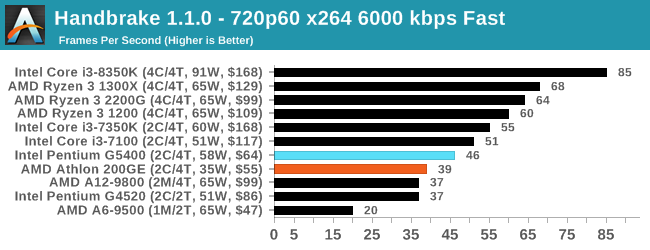
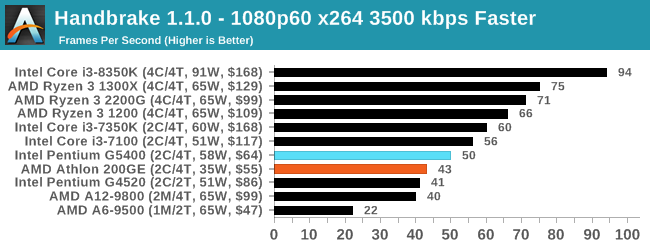
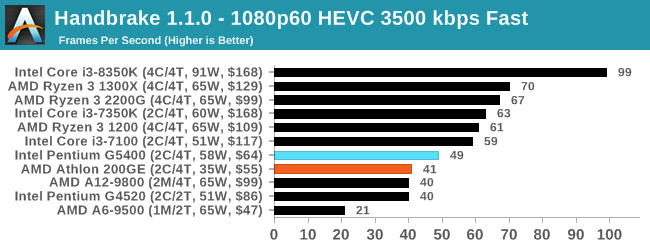
Handbrake manages to use the Pentium resources and higher frequency better, scoring about a 15% win in every circumstance.
7-zip v1805: Popular Open-Source Encoding Engine
Out of our compression/decompression tool tests, 7-zip is the most requested and comes with a built-in benchmark. For our test suite, we’ve pulled the latest version of the software and we run the benchmark from the command line, reporting the compression, decompression, and a combined score.
It is noted in this benchmark that the latest multi-die processors have very bi-modal performance between compression and decompression, performing well in one and badly in the other. There are also discussions around how the Windows Scheduler is implementing every thread. As we get more results, it will be interesting to see how this plays out.
Please note, if you plan to share out the Compression graph, please include the Decompression one. Otherwise you’re only presenting half a picture.
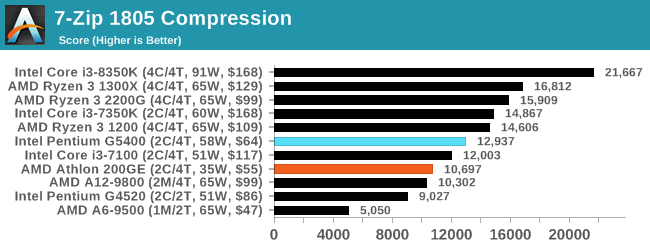
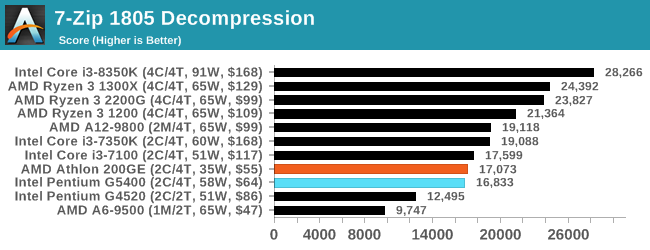
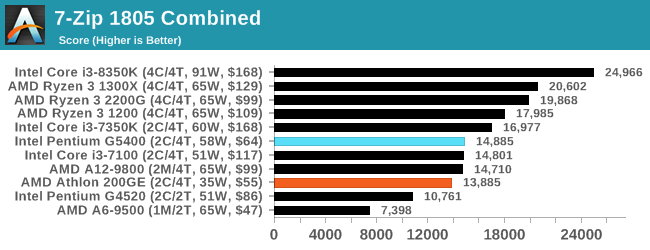
7-zip is an interesting test, given that Intel usually wins Compression but AMD wins Decompression. The same occurs here, however Intel wins the first test by a lot and AMD wins the second test by a small margin. Overall win to Intel here.
WinRAR 5.60b3: Archiving Tool
My compression tool of choice is often WinRAR, having been one of the first tools a number of my generation used over two decades ago. The interface has not changed much, although the integration with Windows right click commands is always a plus. It has no in-built test, so we run a compression over a set directory containing over thirty 60-second video files and 2000 small web-based files at a normal compression rate.
WinRAR is variable threaded but also susceptible to caching, so in our test we run it 10 times and take the average of the last five, leaving the test purely for raw CPU compute performance.
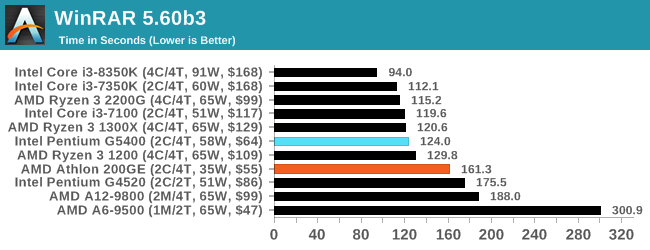
As a mixed workload that involves memory, this result would seem hard to predict given the two CPUs being tested. It ended up a clear win for Intel however – that extra core frequency in the G5400 mattered more than the main memory frequency of the 200GE.
AES Encryption: File Security
A number of platforms, particularly mobile devices, are now offering encryption by default with file systems in order to protect the contents. Windows based devices have these options as well, often applied by BitLocker or third-party software. In our AES encryption test, we used the discontinued TrueCrypt for its built-in benchmark, which tests several encryption algorithms directly in memory.
The data we take for this test is the combined AES encrypt/decrypt performance, measured in gigabytes per second. The software does use AES commands for processors that offer hardware selection, however not AVX-512.
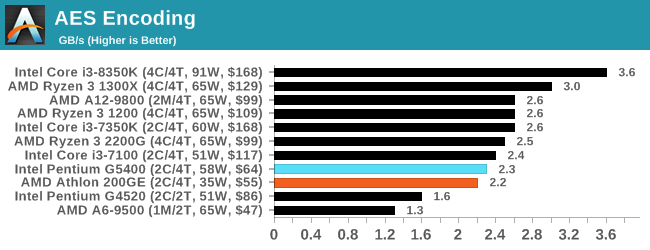










95 Comments
View All Comments
Irata - Tuesday, January 15, 2019 - link
Curious - which Retailer ?Valantar - Tuesday, January 15, 2019 - link
The difference in Norway is slightly larger, with 599NOK for the 200GE vs. 729 for the G5400 - but it's not in stock anywhere, so prices may be fictitious (or there's no supply at all). 200GE supply seems plentiful.andrewaggb - Tuesday, January 15, 2019 - link
I liked the article. I was interested in the 200GE's performance for some headless budget builds and now I know where it sits.I wouldn't use either of these chips on even a budget gaming build. Get a 2200g or i3 8100+ for gaming.
darb - Wednesday, January 16, 2019 - link
On page 3, is "Uses might ask why we are not running Windows 10 x64 RS4, the latest major update" supposed to be "Users might ask why..."?Stuka87 - Wednesday, January 16, 2019 - link
Under gaming with the World of Tanks results, it says GTX1080, but then also has an IGP column, and the IGP column is higher than everything else? Also, Encore engine was released last year, and WoT has been using it since April. So it is no longer "unreleased".GreenReaper - Thursday, January 17, 2019 - link
I think the idea is that it is "IGP"-level *settings*, run on the video card. It's a tad confusing, I agree.just4U - Wednesday, January 16, 2019 - link
I always find it fun to compare budget processors to yesteryear's high end to see where you land up.. It almost looks like this is in the range of a low end 4000 series i5 and a bit better than it's i3 variants. Hmm.. 2 cores though ugh. I'd probably want at least 4.GreenReaper - Thursday, January 17, 2019 - link
It's worth if you can possibly afford it. About the only other situation I see it making sense *not* to is if power or cooling is a major consideration (especially if hyperthreading works for you). My server is just fine on two cores, and that reduces its power and cooling requirements, which have a 35W limit.Death666Angel - Wednesday, January 16, 2019 - link
I sent you a tweet about the lables in the GTX1080 section and then realised I misread it. Deleted the tweet. Oh well. Good conclusion overall, very fair. Aligns perfectly with what I would do.Unfortunately, here (Germany) as well, the Intel CPUs are way overpriced. For a G5400 I can get a Ryzen 3 2200G. So it all kinda falls apart because of the weird CPU shortage.
Manch - Friday, January 18, 2019 - link
Would this be good for a NAS?